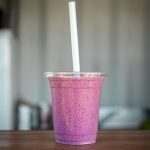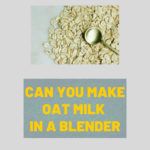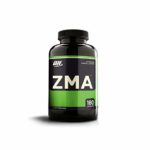When blenders first were introduced to the home market they all has glass blending jars. This was a common design in early model blenders. But overtime most blenders have become designed to have plastic blender jars.
Is this a decline in design standards or is it an improvement?
Well, there are some people who hate to use plastic unless it’s absolutely necessary. They have good reason to be wary of plastic. I myself make it clear that I would only store smoothies and juice in glass bottles in the fridge.
But a blender is not designed to store things in it. Sure, some personal sized blenders advertise that you can add a lid to the blending jar and store it away for later, but that’s not something I advise.
The big question is if there are advantages to using glass blenders over plastic and if they are better options for your intentions.
Do Plastic Blenders Get a Bad Wrap?
Before we examine if glass blenders are better than plastic, let’s discuss if plastic blenders get a bad rap.
The reason most people don’t like to use plastic is because plastic has been linked to health problems. That’s why people who are health conscious use glass water bottles. Plastic water bottles, especially if you reuse them, can be problematic.
But the truth is that it’s not all plastic that is bad, it’s only plastic that leaches and not all plastic is a risk.
Cheap plastic made with BPA is a problem. That’s why you see people looking for BPA free blender bottles, BPA free water bottles, and other devices.
Glass water bottles are preferred, but if you’re using them at the gym or out hiking then glass can be dangerous.
It’s the same with a blender. If you are using a blender to blend cold ingredients such as frozen fruit, or regular fruit and vegetables or even nuts (you can make nut butter with your blender) then you don’t have to worry about plastic.
The only consideration that you should be aware of is if you’re making hot liquids or blending hot materials such as a soup. In those cases, you do have to make sure you are using a blender that is designed for hot liquids.
There are two concerns when using a blender to blend hot liquids—we will discuss this more below. The first is that you will want to be careful of the pressure created. The second is that hot liquids can be risky if you are using a cheap blender that doesn’t have strong plastic.
For hot liquids, I would recommend using an immersion blender. These are better, especially because you can stick them right into a stockpot when you are making soup.
Do They Still Make Glass Blenders?
Yes, they still do make glass blenders. Now, the thought behind buying a glass blender normally centers around the idea that plastic blenders are dangerous and not safe.
That doesn’t necessarily have to be true. If you are buying a good blender (a Ninja, a Vitamix, or the like..) then you’re getting a strongly built and substantial blender. The plastic that is used with good blenders is not a problem for making smoothies, frozen fruit drinks, or even nut butters.
Glass blenders might be a better option if you are making tomato based sauces in a blender on a regular basis—since tomatoes are acidic and they can wear down and be hard to clean.
I would have no hesitation buying a glass blender as long as I was comfortable with the cleaning requirements. Glass is more fragile than plastic, so if you drop things on your floor and like shatter proof plastic, then it might be a wise idea to opt for plastic.
If you don’t have an issue with breaking appliances and dropping glass, then it might be better to just go ahead.
Are Glass Blenders Heat Resistant
Yes, glass blenders are usually made to be heat resistant. But then again so are the better made plastic models.
The main thing to be cautious of when using a blender and blending anything hot is that it can create a suction effect and burn you if it pops the blender top.
For hot soups, or hot liquids, glass blenders tend to be a bit better than the normal plastic blender jars.
Some blenders such as Vitamix have better sealing systems so that can also be used.
I would suggest, though, that you don’t just buy a glass blender if you want to blend up hot liquids. That can be a recipe for disaster.
Make sure that whatever blender you buy, you choose one that states that it can blend and handle hot liquids. Not all blenders are capable of blending hot liquids, not even the glass blenders.
If you really are someone who wants to blend hot liquids—namely soup—then I would suggest that you buy a stick blender. These immersion style blenders are superior to regular blenders for making a pureed soup.
Do Glass Blenders Break?
Yes. Glass blenders break. So do plastic blenders. Unless you are using something like stainless steel, you can break your blender by dropping it on the floor.
The more particular question is if a glass blender will break if you are using it in a regular way.
Realistically, it’s very unlikely that your blender will break for any particular reason. The main causes for a glass blender breaking is misuse.
Blenders shouldn’t break from normal use. You can blend up ice and frozen drinks, you can blend up nuts to make almond butter, and you can blend hot liquids (with caution and according the specific blenders instructions).
The reason that blenders tend to break is either misuse (blending them non-stop for long periods of time—20 minutes for instance! —and burning out the motor) or dropping them onto the floor and breaking them.
If you use a blender in the prescribed manner you can make all sorts of drinks without any issue
Don’t Count Out Plastic: It’s Better Than You Think
The rule of thumb that I like to give people is that glass blenders are not better than plastic blenders, especially if you’re buying a name brand like: Ninja, Vitamix, or Nutribullet.
Glass blenders are fine to use, and they look nice, but they are not really more functional than regular plastic blenders.
If you’re buying a well made blender, then the plastic used is not going to be the cheap plastic used with water bottles (BPA). You’re getting a higher grade plastic.
The major downside to buying a glass blender is that there are not that many to choose from. Most of the major blender brands make their blenders in plastic because they don’t want to manufacture glass blenders that can shatter if they are dropped on the floor.
Plastic is simply more durable. For most people, a good plastic blender is going to be superior to a glass blender.
In fact, Ninja is one of the most popular brands of blender on the scene. It’s highly regarded as a strong, durable blender that can make everything from frozen fruit smoothies to nut butter. And Ninja blenders don’t have glass pitchers.
Related Posts

Hi Everyone!
Jenny O’Brien here. Nutritionist & personal trainer. Just your average vegetarian and smoothie fanatic!
If you have any questions, or you’d like me to cover a particular topic, drop me a line and let me know!
Thanks!






